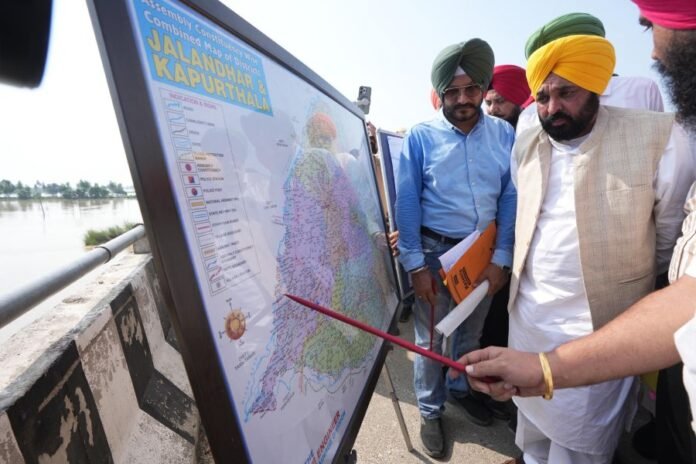Punjab is reeling under the devastating impact of floods triggered by incessant heavy rainfall in the neighboring hill states, leaving thousands of families in distress and causing widespread destruction of crops, homes, and livestock. The relentless downpour in upstream regions has pushed excess water into Punjab’s low-lying districts, severely affecting agricultural fields and displacing communities who now find themselves battling nature’s fury. The state is witnessing large-scale damage to farmlands, infrastructure, and property, and the situation has forced the administration to deploy massive relief and rescue operations across flood-hit zones. Amid the crisis, Chief Minister Bhagwant Singh Mann has stepped forward with a firm assurance that the state government will compensate the people for every single penny lost during this calamity and ensure that no family is left unaided in their hour of suffering.
During his whirlwind tour of the flood-affected Kapurthala district, CM Mann directly interacted with the victims and assessed the extent of damage. He underlined that human life remains the top priority of his government and pledged to leave no stone unturned in providing relief and rehabilitation. While acknowledging that the flooding was primarily a consequence of heavy rainfall in hill states that cascaded into Punjab’s rivers, he reaffirmed that his government is committed to protecting lives, minimizing hardship, and planning long-term solutions to avert such disasters in the future. His personal monitoring of the unfolding situation, coupled with instructions to officials for fair and transparent damage assessment, reflects the urgency with which the state is responding to the crisis.
To ensure accountability and justice in compensation, the Chief Minister announced a special Girdawari—a systematic survey to record losses suffered by families, farmers, and businesses due to the floods. He directed administrative officers to carry out this assessment in a transparent manner, leaving no scope for bias or negligence. This special survey will cover crop damage, loss of livestock, destruction of houses, and other economic impacts suffered by households, particularly in the low-lying areas that bore the brunt of overflowing waters. Mann promised that his government would ensure full reimbursement of losses, whether in agriculture, property, or livelihood, emphasizing that no citizen of Punjab would be left to bear the burden alone.
At the ground level, large-scale relief and rescue missions are already underway, with the state government coordinating efforts to supply food, shelter, and medical care to affected populations. Special emphasis has been placed on Kapurthala and adjoining districts, where rivers and tributaries have caused extensive flooding. The Chief Minister also conducted an aerial survey of areas between Makhu and Harike Patan to review the severity of the situation and to expedite state-level planning for immediate and long-term interventions.
Punjab’s approach resonates beyond regional boundaries, highlighting the challenges faced by states vulnerable to climate-related disasters. The floods in Punjab serve as a stark reminder of how heavy rains in hill states like Himachal Pradesh and Uttarakhand can impact downstream regions, exposing gaps in flood-preparedness and disaster management strategies across northern India. Globally too, such incidents underscore the increasing frequency of climate-linked calamities, adding urgency to discussions on sustainable infrastructure, early-warning systems, and disaster-resilient planning.
As Punjab struggles to recover from this natural disaster, CM Mann’s announcement of full compensation seeks to reassure citizens that the state stands solidly with them in their toughest times. The government’s proactive relief measures, coupled with promises of financial support and future preparedness, mark a significant response to an unprecedented crisis.
This is a web generated news report
Source: Punjab Government communication and field updates




